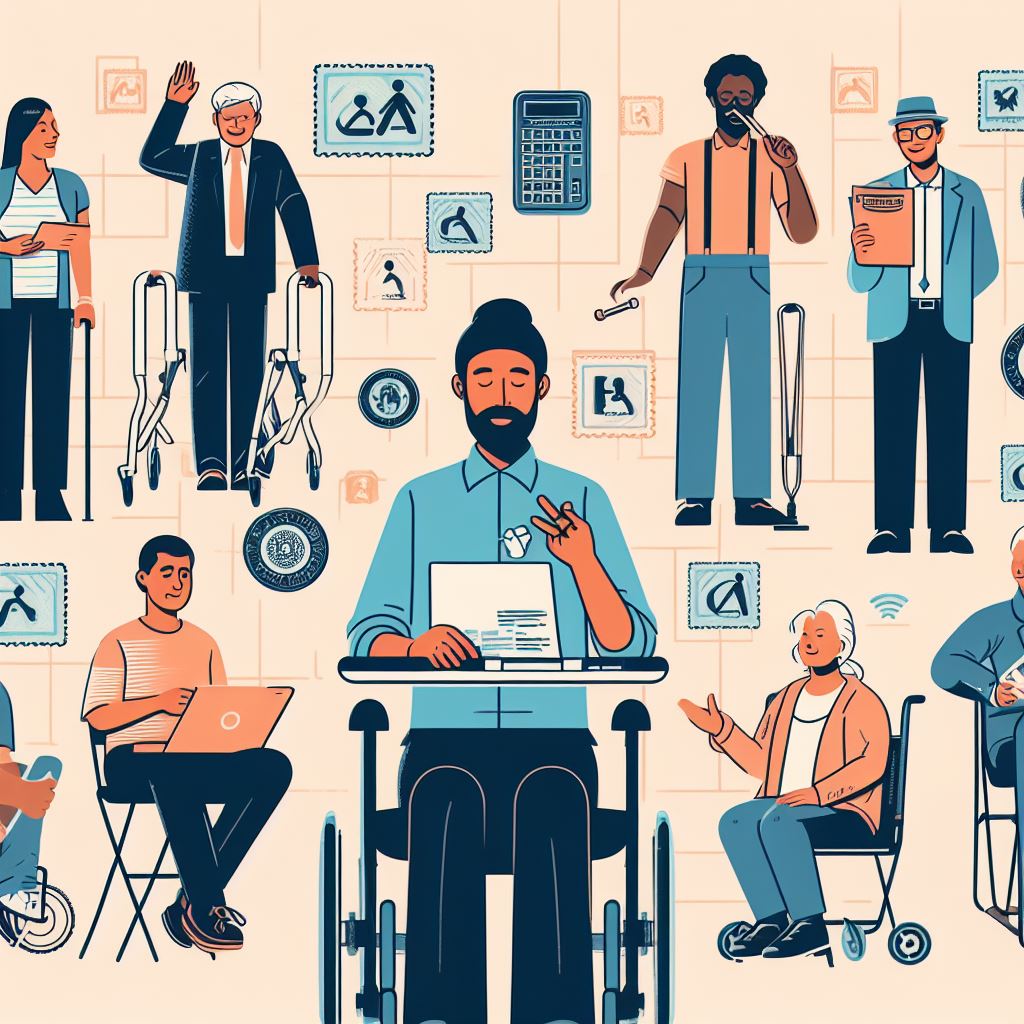Why Are Disabled Individuals Granted Government Assistance Stamps?

Imagine a world where disabled individuals struggle to meet their basic needs. Thankfully, government assistance stamps provide crucial support to those facing financial challenges.
But why are disabled individuals granted this assistance? In this article, we will delve into the eligibility criteria, the role of government assistance in ensuring well-being, and debunk misconceptions surrounding this support.
By understanding the importance of government assistance for disabled individuals, we can foster a more compassionate and inclusive society.
Key Takeaways
- Disabled individuals are granted government assistance stamps based on specific eligibility criteria set by the government, taking into account factors such as income level, family size, and disability status.
- Government assistance stamps play a crucial role in addressing the financial challenges faced by disabled individuals, including increased healthcare expenses, accessibility modifications, loss of income, and the need for additional support.
- Government assistance ensures that basic needs are met by providing financial support through programs like SSI and SSDI, covering essential expenses, granting access to healthcare services through Medicaid, and assisting with securing affordable housing through programs like the Section 8 Housing Choice Voucher Program.
- The overall well-being of disabled individuals is positively impacted by government assistance, including improved access to healthcare, reduction of financial strain, increased financial stability, access to community services and support networks, and enhanced social well-being and inclusion.
Eligibility Criteria for Government Assistance Stamps
To be eligible for government assistance stamps, you must meet the specific criteria set forth by the government. These criteria are designed to ensure that the assistance reaches those who truly need it.
The government takes into consideration various factors such as income level, family size, and disability status when determining eligibility for assistance stamps.
One of the main criteria for receiving government assistance stamps is income level. The government sets a maximum income threshold, and individuals or families whose income falls below this threshold may qualify for assistance. This ensures that those with limited financial resources are able to receive the support they need to meet their basic needs.
Additionally, family size is taken into account when determining eligibility. Larger families may have higher expenses, and the government recognizes this by adjusting the income threshold based on the number of individuals in the household. This ensures that families with more dependents aren’t excluded from receiving assistance simply because their income exceeds the threshold for smaller households.
Lastly, disability status is a crucial factor in determining eligibility for government assistance stamps. Individuals with disabilities often face additional challenges and expenses, and the government recognizes the need to provide them with extra support. By including disability status as a criterion, the government ensures that disabled individuals have access to the assistance they require.
The Financial Challenges Faced by Disabled Individuals
Disabled individuals face significant financial challenges in their daily lives. Due to their disabilities, they often encounter additional expenses related to healthcare, accessibility, and specialized equipment. These financial burdens can be overwhelming, making it difficult for them to fully participate in society and meet their basic needs.
To understand the financial challenges faced by disabled individuals, let’s take a closer look at some of the key areas where they experience increased costs:
| Financial Challenge | Explanation |
|---|---|
| Healthcare expenses | Disabled individuals often require frequent medical consultations, therapies, and medications, which can be costly. Additionally, they may need specialized equipment, such as wheelchairs or hearing aids, which can be expensive and not fully covered by insurance. |
| Accessibility modifications | Many disabled individuals require modifications to their homes or vehicles to enhance accessibility. These modifications, such as ramps, widened doorways, or accessible bathrooms, can be costly but are essential for their independence and mobility. |
| Loss of income | Disabilities can often prevent individuals from working or limit their ability to earn a stable income. This loss of income can create financial strain, making it challenging to cover basic living expenses and maintain a decent standard of living. |
These financial challenges faced by disabled individuals highlight the need for government assistance programs, such as Supplemental Nutrition Assistance Program (SNAP) or disability benefits, to provide them with the necessary support to meet their financial needs. Without these programs, disabled individuals would face even greater economic hardship and struggle to maintain a decent quality of life.
The Role of Government Assistance in Ensuring Basic Needs Are Met
Government assistance plays a crucial role in ensuring that disabled individuals’ basic needs are met. Disabled individuals often face additional challenges that hinder their ability to meet their basic needs independently. These challenges can include physical limitations, limited employment opportunities, and increased healthcare expenses. Government assistance programs provide a safety net that helps bridge the gap between their needs and available resources.
One key aspect of government assistance is the provision of financial support. Programs such as Supplemental Security Income (SSI) and Social Security Disability Insurance (SSDI) provide monthly income to disabled individuals who are unable to work or have limited earning capacity. This financial support helps cover essential expenses such as food, housing, and transportation.
In addition to financial support, government assistance programs also offer access to healthcare services. Medicaid, for example, ensures that disabled individuals have access to necessary medical treatments, medications, and therapies. This is particularly important as disabled individuals often require ongoing medical care to manage their conditions and maintain their overall well-being.
Furthermore, government assistance programs may provide assistance in securing affordable housing. Disabled individuals may face difficulties finding suitable housing options that accommodate their specific needs. The Section 8 Housing Choice Voucher Program, for instance, helps disabled individuals afford housing in the private market by subsidizing a portion of their rent.
The Impact of Government Assistance on the Overall Well-Being of Disabled Individuals
Receiving government assistance can significantly improve the overall well-being of individuals with disabilities. Research has shown that disabled individuals often face additional challenges in their daily lives, such as limited mobility, increased medical expenses, and barriers to employment. Government assistance programs, such as Supplemental Security Income (SSI) and the Supplemental Nutrition Assistance Program (SNAP), aim to alleviate these burdens and provide necessary support.
One key impact of government assistance on the well-being of disabled individuals is improved access to healthcare. Disabled individuals often require specialized medical care and medications, which can be expensive. Government assistance programs can help cover these costs, ensuring that individuals can receive the necessary treatments without financial strain. This not only improves their physical health but also reduces stress and anxiety associated with medical expenses.
Financial stability is another important factor in overall well-being. Disabled individuals may face difficulties in finding employment due to their disabilities, leading to financial insecurity. Government assistance programs provide a safety net by offering financial support and stability, allowing individuals to meet their basic needs and maintain a decent standard of living.
Additionally, government assistance can help improve the social well-being of disabled individuals. It can provide access to community services and support networks, reducing feelings of isolation and promoting inclusion. By alleviating financial burdens, government assistance allows individuals to participate in social activities and pursue hobbies that contribute to their overall well-being.
Addressing Misconceptions and Stereotypes Surrounding Government Assistance for Disabled Individuals
Addressing misconceptions and stereotypes about government assistance for disabled individuals requires understanding the purpose and impact of these programs. It’s important to recognize that government assistance programs, such as Supplemental Security Income (SSI) and the Supplemental Nutrition Assistance Program (SNAP), aim to provide support for individuals with disabilities who may face significant financial and physical challenges.
One common misconception is that individuals receiving government assistance are lazy or unwilling to work. However, the reality is that many disabled individuals face barriers to employment due to their disabilities. According to the Bureau of Labor Statistics, the employment rate for people with disabilities is significantly lower than for those without disabilities. Government assistance helps to bridge the financial gap for disabled individuals who may be unable to work or earn a sufficient income.
Another stereotype is that government assistance encourages dependence and discourages individuals from seeking employment. However, studies have shown that receiving government assistance doesn’t necessarily discourage individuals from working. In fact, research suggests that assistance programs can act as a stepping stone towards self-sufficiency by providing temporary support during periods of unemployment or financial instability.
It is crucial to approach the topic of government assistance for disabled individuals with empathy and compassion. A deeper understanding of the purpose and impact of these programs can help dispel misconceptions and challenge stereotypes, ultimately fostering a more inclusive and supportive society for all individuals.
Frequently Asked Questions
How Do Disabled Individuals Apply for Government Assistance Stamps?
To apply for government assistance stamps, you can start by contacting your local Department of Social Services. They will guide you through the application process, which may involve providing documentation of your disability and financial situation.
Are There Any Restrictions on What Disabled Individuals Can Purchase With Government Assistance Stamps?
There are some restrictions on what you can purchase with government assistance stamps as a disabled individual. These restrictions vary, but generally, you cannot buy items like alcohol, tobacco, or hot prepared foods.
How Long Can Disabled Individuals Receive Government Assistance Stamps?
Disabled individuals can receive government assistance stamps for an indefinite period, as long as they continue to meet the eligibility criteria. These stamps help ensure that individuals with disabilities have access to the necessary means to meet their basic needs.
Can Disabled Individuals Receive Additional Financial Support in Addition to Government Assistance Stamps?
Yes, disabled individuals can receive additional financial support in addition to government assistance stamps. Programs like Supplemental Security Income (SSI) and Social Security Disability Insurance (SSDI) provide extra financial assistance to those who qualify.
How Does Government Assistance for Disabled Individuals Differ From Other Forms of Government Assistance Programs?
Government assistance for disabled individuals differs from other programs by providing additional financial support through stamps. This assistance aims to address the unique challenges faced by disabled individuals, ensuring their basic needs are met and promoting their overall well-being.



